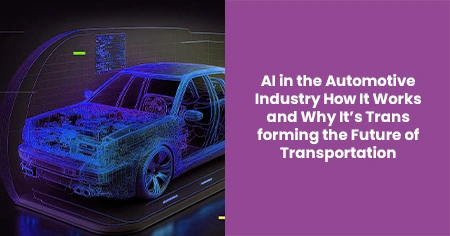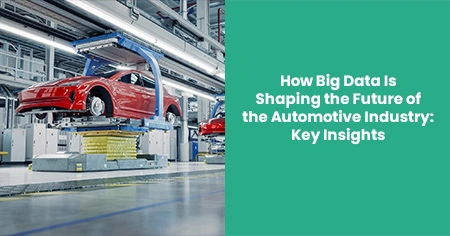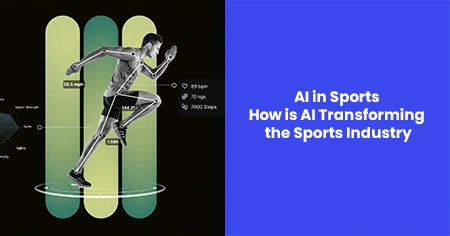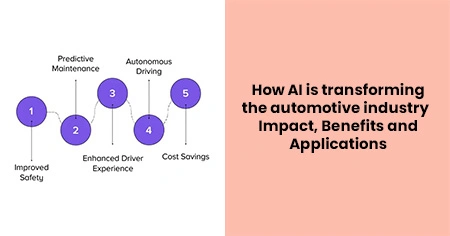The market is expected to be worth an astonishing $35.71 billion by 2033. This growth demonstrates AI's significance in revolutionizing automotive software development services and its fundamental impact on the industry.
In recent years, the automotive industry has found itself on the verge of another paradigm upheaval, propelled by the rapid growth of artificial intelligence (AI) technology. AI can revolutionize the automotive sector and redefine everything from vehicle design to the driving experience.
From self-driving cars to smart manufacturing, AI has transformed how cars are designed, made, driven, and maintained.
This article investigates the impact of AI in software development in automotive industry, how it is changing various aspects of the business, and the difficulties and opportunities it brings.
AI in the Automotive Industry

AI is transforming sectors worldwide, including the software development in automotive industry. While the concept of AI automation frequently conjures up images of self-driving automotive, its applications go well beyond that. Automakers are using AI to improve many aspects of their operations and products.
In predictive maintenance, artificial intelligence (AI) analyzes vehicle data in real-time to predict when parts may fail. This allows for timely repairs and reduces breakdowns, increasing the vehicle's lifespan and saving both manufacturers and buyers money.
AI also contributes significantly to improving the consumer experience. Automakers are implementing AI-powered chatbots for smooth customer service and individualized in-car infotainment systems, utilizing AI to understand better and cater to their customers' needs. This provides a more enjoyable, personalized, and rewarding driving experience.
Furthermore, AI enhances production lines by increasing efficiency, decreasing errors, and speeding up procedures.
AI-powered robots and automated systems allow firms to streamline processes, increasing productivity and lowering production costs. This optimization is critical for automakers to maintain competitiveness in a fast-paced business.
AI-based technologies, such as advanced driving assistance systems (ADAS), revolutionize road safety. Features such as autonomous emergency braking, lane-keeping assistance, and collision avoidance systems help prevent accidents and make driving safer.
To stay ahead in a highly competitive industry, manufacturers must accelerate the development of artificial intelligence. It allows them to meet rising customer expectations while assuring compliance with increasingly strict safety and environmental regulations. Integrating artificial intelligence in transportation industry is driving innovation and defining the future of mobility.
How AI Works in the Automotive Industry
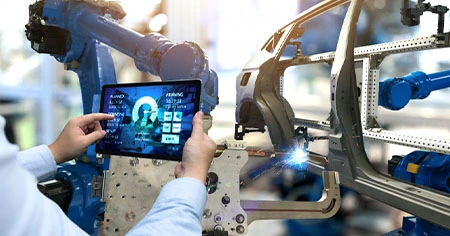
Artificial Intelligence (AI) is rapidly revolutionizing the automotive industry by driving innovation, enhancing safety, improving efficiency, and shaping the future of mobility. AI in automotive industry works through a combination of advanced technologies, including:
Machine Learning (ML)
- Algorithms analyze vast amounts of data to detect patterns and improve systems over time.
- Used in predictive maintenance, traffic prediction, and personalization of in-car experiences.
Computer Vision
- Cameras and sensors process visual data to identify objects, pedestrians, and road signs.
- Critical for autonomous vehicles and advanced driver-assistance systems (ADAS).
Natural Language Processing (NLP)
- Enables vehicles to understand and respond to voice commands for navigation, entertainment, and communication.
- Forms the backbone of AI-powered virtual assistants.
IoT and Connectivity
- Vehicles are connected to a network, enabling real-time data exchange for better decision-making.
- Supports features like fleet management and over-the-air updates.
Deep Learning
- Facilitates complex decision-making, such as recognizing unpredictable driving scenarios.
- Powers autonomous driving capabilities.
Benefits of AI in Automotive Industry
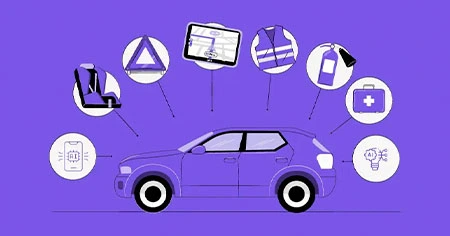
Here are some benefits of AI in the automotive sector.
From optimizing operations to increasing consumer experience and opening up new technological innovation channels, AI paves the way for software development in automotive industry greatness. Let us explore the incredible benefits that AI is providing to this market, concentrating on company efficiencies, client retention, and technological improvements from a futuristic perspective.
Smart supply chain management: AI algorithms improve supply chain efficiency by estimating demand, optimizing inventory, and coordinating logistics. This will result in a lean, responsive supply chain with reduced waste and higher production.
Intelligent maintenance systems: AI-driven maintenance systems will anticipate future vehicle difficulties even before they occur, allowing for proactive repair. This reduces unexpected malfunctions, resulting in perfect operations with cost savings.
Automated production lines: AI-enabled robots and automation technologies will simplify and accelerate the manufacturing process while reducing the possibility of human error. This will ensure quality consistency and reduce the time required to sell new vehicles.
AI-driven customer support: Virtual assistants and chatbots enable 24-hour customer support, allowing for responses to queries and concerns. This promotes client happiness by providing a smooth, efficient service experience.
Personalization of dealership interactions: With AI, dealerships can consider a recommendation based on the customer's history and preferences, resulting in a more personalized transaction and long-term customer loyalty.
Smart infotainment systems: AI makes infotainment systems smarter, transforming the rest of the vehicle into a fun and interactive experience with personalized driving, entertainment, and connectivity options. These technologies are designed to learn user preferences, making the cabin environment intuitive and enjoyable.
Advanced safety features: Adaptive cruise control, lane departure warnings, and autonomous emergency braking are examples of how artificial intelligence can improve car safety. These features assist drivers in making better judgments, which reduces the likelihood of an accident, demonstrating the immense potential of AI and AI development services in shaping the future of automotive innovation.
The Future of AI in Transportation
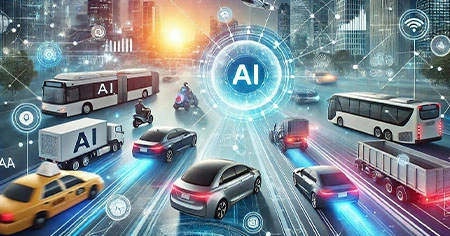
AI is transforming the automotive sector in various ways. Machine learning algorithms quickly revolutionize automotive technologies, from enhanced driver assistance systems to self-driving cars.
Beyond the road, artificial intelligence (AI) is transforming the production process, streamlining processes and increasing efficiency in automotive manufacturing.
Potential uses of artificial intelligence in the automotive industry include:
AI for predictive maintenance
Predictive maintenance uses artificial intelligence to continuously analyze vehicle systems and components for signs of wear and tear or irregularities. By analyzing massive volumes of sensor data, AI algorithms may detect trends that indicate probable problems, preventing unanticipated breakdowns.
AI-powered autonomous vehicles
Self-driving cars are intended to navigate and operate without human involvement. AI algorithms use perception to assess real-time sensor data, detect surrounding objects, estimate their distance and speed, and anticipate future motions. This knowledge is critical for data-driven decision-making, where AI calculates the optimal course of action, such as accelerating, braking, or changing lanes.
AI-enabled design and engineering
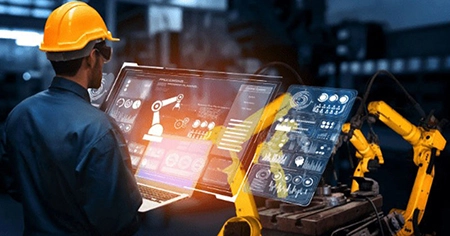
AI is transforming automotive design and engineering by offering new tools and approaches. For example, several companies have employed AI to create lightweight, durable materials for automotive components, resulting in increased fuel efficiency and performance. Others have used AI to optimize engine design, producing more power and lower emissions.
Personalized customer experiences
AI can thoroughly grasp client wants and preferences by analyzing customer data such as purchase history, browsing behaviour, and social media interactions. This intelligence can be applied to highly tailored marketing efforts, interactions, and post-sales services.
Optimized supply chain
By increasing visibility and transparency throughout the supply chain, AI enables automotive businesses to discover issues early on and take corrective action when necessary.
This increased visibility is achieved by combining data from several sources, such as production schedules, inventory levels, supplier performance, and transportation logistics.




